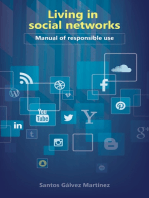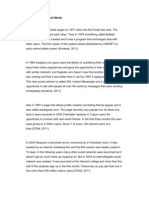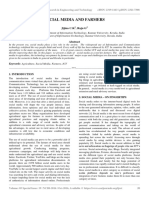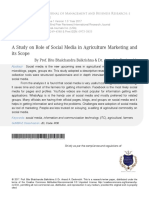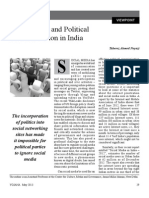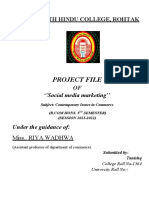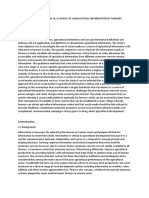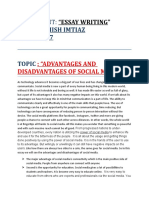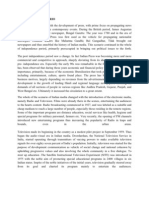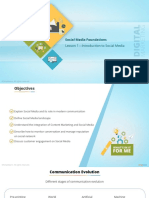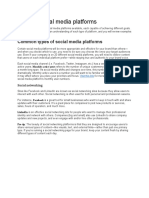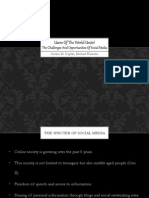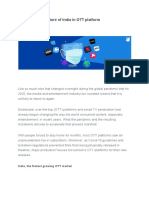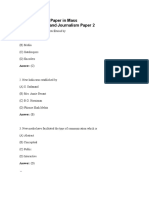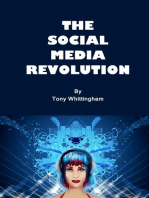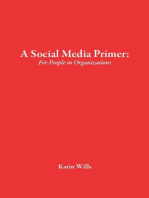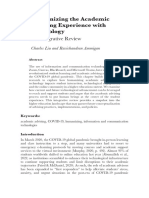Social Media Use
Social Media Use
Uploaded by
STAR ScholarsCopyright:
Available Formats
Social Media Use
Social Media Use
Uploaded by
STAR ScholarsCopyright
Available Formats
Share this document
Did you find this document useful?
Is this content inappropriate?
Copyright:
Available Formats
Social Media Use
Social Media Use
Uploaded by
STAR ScholarsCopyright:
Available Formats
Social Media Use: An Exploratory Test of Effects on the Daily Lives of College Students
Research Articles
ABSTRACT This study covers the effects that social media use has on the daily lives of college students. More specifically, the current study focuses on college students academic success, study habits, social interaction, and family interaction. Social media is a source of online tools that allow people from across the world to communicate with others. This growing trend has become very popular among those who use the internet on a daily basis, especially students. Social media has become so popular that many businesses now use it to advertise their products and colleges use it to connect with their current and future students. Because social media use is becoming more and more popular every day, college students find themselves spending the majority of their time online. Using social media excessively reduces the time that students spend studying. This can cause lowered academic standing, bad grades, and loss of scholarships. Students can also see their social and family lives become affected by social media use. Although being online allows people to have easier communication, it can also cause problems. The best research tool to use for contacting college students is the survey method because it can accurately cover a variety of people and their lifestyles. Introduction Todays college students are the most wired generation in history. Also known as the Net Generation or the Millennials, college students use technology such as internet, e-mail, blogs, and social networks in their everyday repertoire of communication and connection tools at a higher rate than individuals from any other generation (Junco & Cole-Avent, 2008). Social networking sites are websites that encourage people to establish a network of connections to others. In 2007, Kay defined social media as unique because it allows the ability to define ones own social network and interact in new ways. Indeed, users on many of these sites arent looking to meet new people but to communi
Barbara Barnett Katherine Cothern Arkansas State University
cate with others who are already part of their social network (Acar, 2008). Schwalbe (2009) called this engaging in naked conversations, meaning those involved in social networking bare their souls to family, friends, and even the world. The purpose of our research is to examine social media and its influence on the everyday lives of college students from academic success and study habits to social satisfaction and family interaction. Schwalbe (2009) conducted a survey that found 18-24-year-old college students lead intensely social lives (p.60). He also stated that the Millennials life-long interaction with digital media has created students who think and process information fundamentally different from their predecessors (p.63). The growth of social media and its effects on young adults can be seen in The Social Network, a movie released in 2010 describing the foundation behind Facebook and how it changed the world of technology and communication. The effect of social media can also be seen in the 2008 U.S. Presidential election. Barack Obama and his campaign leaders created a social networking site, my.barackobama.com, to recruit thousands of U.S. citizens to participate in door-knocking and precinctwalking (Valenzuela, Park, & Kee, 2009). The social media efforts helped the campaign prosper. Social networking sites like Facebook, MySpace, and Twitter arent the only component of social media. Other social media tools, such as blogs and instant messaging, have also gained quite a bit of attention over the past few years. Blogging involves posting information in dated entries. Junco (2008) found that 27.9 percent of college students reported owning a blog, while 44.4 percent reported reading them for about an hour each week. Instant messaging involves using specific software applications to engage in a real time back-and-forth exchange. In 2007, 75.5 percent of college students used instant messaging and stayed logged on for a median of thirty-five hours a week (Junco & Cole-Avent, 2008). For college students, nothing is more important than staying connected through networking, content sharing, and messaging (Schwalbe, 2009) but how does this truly affect college students, mainly those that attend Arkansas State University? Does frequent exposure to social media sites lead to bad study habits? Do bad study habits lead to lower academic success in college? Does social media use positively or negatively affect the social life of college students? Does social media use increase or decrease family involvement? The only way to confirm our speculations is to conduct research involving college students, themselves. We will be examining the relationship among four variables. In all, social media has brought a whole new meaning to the world of communication. Whether you hear them called the Net generation, the Millennials, Digital Natives, or Generation Y, college students know more about social media than any other generation before them. They stay up-to-date with the latest news, gossip, and relationship status changes. Acar (2008) said it best: Undoubtedly these [social media] tools enable us to connect with each other more than ever before (p.63). Literature Review The purpose of this study is to identify the affects of
Volume 1 Issue 1 Spring 2011
Journal of International Students 9
You might also like
- CCMP Social Network AnalysisDocument21 pagesCCMP Social Network AnalysisEarthJournalismNo ratings yet
- Automechanika 2017 CatalogueDocument202 pagesAutomechanika 2017 CatalogueAlex Renne ChambiNo ratings yet
- Social Media TodayDocument9 pagesSocial Media TodayNdong'a DaudiNo ratings yet
- The History of Social MediaDocument3 pagesThe History of Social MediaSandy de la Garza100% (1)
- Social Media and FarmersDocument6 pagesSocial Media and Farmersadipoliachayan5235No ratings yet
- 5 A Study On Role of Social Media PDFDocument5 pages5 A Study On Role of Social Media PDFsaranya pugazhenthiNo ratings yet
- Social MediaDocument27 pagesSocial MediaAaymah Saeed O-1 SerenityNo ratings yet
- Case Studies - Airlines On Social MediaDocument10 pagesCase Studies - Airlines On Social MediaPartha BiswalNo ratings yet
- Social MediaDocument15 pagesSocial MediaUmut Turan100% (1)
- Social MediaDocument26 pagesSocial MediaMike Warner100% (2)
- Innovations in Social Media For Agricultural Information System Delivery and NetworkingDocument40 pagesInnovations in Social Media For Agricultural Information System Delivery and NetworkingVilo MuskaNo ratings yet
- Social Media and PoliticalDocument3 pagesSocial Media and Politicalraja748No ratings yet
- Social CapitalDocument24 pagesSocial CapitalDevin MartinNo ratings yet
- Socail Media ReportDocument20 pagesSocail Media ReportbreannanoldNo ratings yet
- MediaFactBook2012 InitiativeDocument58 pagesMediaFactBook2012 Initiativebehemoth01No ratings yet
- Social Media MarketingDocument43 pagesSocial Media MarketingKashish Rohilla100% (1)
- Marines Social Media HandbookDocument48 pagesMarines Social Media HandbookRickNo ratings yet
- Social Media For FarmersDocument6 pagesSocial Media For FarmersaniketNo ratings yet
- Assignment: Name: Armish Imtiaz Roll No: 37: TopicDocument3 pagesAssignment: Name: Armish Imtiaz Roll No: 37: TopicKhubaib Imtiaz100% (1)
- Social MediaDocument15 pagesSocial Mediasaoussen souidi100% (1)
- A Qualitative Analysis of Social Networking UsageDocument28 pagesA Qualitative Analysis of Social Networking UsageNur HusninaNo ratings yet
- CBSE UGC NET December 2015 Syllabus For Mass Communication and JournalismDocument5 pagesCBSE UGC NET December 2015 Syllabus For Mass Communication and JournalismVenkatesh Babu GNo ratings yet
- Indian Media ScenarioDocument3 pagesIndian Media ScenarioShailesh Singh100% (2)
- Impact of MediaDocument6 pagesImpact of MediaRana Sher AliNo ratings yet
- Vimeo OTT Ebook4Document21 pagesVimeo OTT Ebook4Gladston GomezNo ratings yet
- Study The Role of Social Media Using Mobile Devices in 2014 Lok Sabha Election Er. Niranjan SinghDocument7 pagesStudy The Role of Social Media Using Mobile Devices in 2014 Lok Sabha Election Er. Niranjan SinghenggniranjanNo ratings yet
- Social Media FoundationsDocument256 pagesSocial Media FoundationsRuan KartoNo ratings yet
- The Role of Digital Payment in Agriculture 2017Document52 pagesThe Role of Digital Payment in Agriculture 2017Tuấn Thế NguyễnNo ratings yet
- The Effect of Social Media in The Studies and Lifestyle ....Document18 pagesThe Effect of Social Media in The Studies and Lifestyle ....melchieNo ratings yet
- FTI Journalism Trends 2019 FinalDocument155 pagesFTI Journalism Trends 2019 FinalFelipe SaldanhaNo ratings yet
- The Role of New and Social Media in Tanzanian Hip-Hop Production in Cahiers D'études AfricainesDocument22 pagesThe Role of New and Social Media in Tanzanian Hip-Hop Production in Cahiers D'études AfricainesmkibonaNo ratings yet
- Model Questions Paper For Journalism & Mass Communication (Hons)Document42 pagesModel Questions Paper For Journalism & Mass Communication (Hons)Christopher Lee100% (1)
- The Major Social Media Platforms PDFDocument11 pagesThe Major Social Media Platforms PDFCj ManalansanNo ratings yet
- Media of AdvertisingDocument22 pagesMedia of Advertisingpratyo100% (6)
- Election SynopsisDocument5 pagesElection SynopsisMayank MahlaNo ratings yet
- Popular Social Media PlatformsDocument5 pagesPopular Social Media PlatformsAdeel Chughtai100% (1)
- A Study ofSOCIAL MEDIA AND ITS ROLE IN MARKETING 2.0Document63 pagesA Study ofSOCIAL MEDIA AND ITS ROLE IN MARKETING 2.0tanishqNo ratings yet
- Social Media Impact On Business EvaluationDocument7 pagesSocial Media Impact On Business EvaluationVince Villamin SatinNo ratings yet
- MCQ On Communication - Extensive 12 Years Solved NET ExamDocument33 pagesMCQ On Communication - Extensive 12 Years Solved NET Examlaale dijaanNo ratings yet
- The Influence of Social Media Advertising On Purchase Behaviour Towards FMCGDocument4 pagesThe Influence of Social Media Advertising On Purchase Behaviour Towards FMCGM KashifNo ratings yet
- Social Media ReportDocument92 pagesSocial Media ReportVaibhav Sharma100% (2)
- MIS - Social MediaDocument7 pagesMIS - Social MediaSantosh JKNo ratings yet
- State of OTTDocument44 pagesState of OTTSam FarhatNo ratings yet
- Future of India in OTT PlatformDocument4 pagesFuture of India in OTT PlatformShriyansh AsatiNo ratings yet
- Solved Question Paper in MassDocument50 pagesSolved Question Paper in Massmohd janja choumNo ratings yet
- Types of Advertising Media PDFDocument25 pagesTypes of Advertising Media PDFRAJPRADEESHNo ratings yet
- Social Media and Society - Lecture 4th March 2022Document10 pagesSocial Media and Society - Lecture 4th March 2022Yogesh MishraNo ratings yet
- Global Media ChapterDocument22 pagesGlobal Media Chaptermrsloan100% (1)
- Influence of Social Media As A Tool of Political Marketing in General ElectionsDocument6 pagesInfluence of Social Media As A Tool of Political Marketing in General ElectionsUIJRT United International Journal for Research & TechnologyNo ratings yet
- Engaging Consumers and Building Relationships in Social Media - How Social Relatedness Influences Intrinsic vs. Extrinsic Consumer MotivationDocument10 pagesEngaging Consumers and Building Relationships in Social Media - How Social Relatedness Influences Intrinsic vs. Extrinsic Consumer MotivationfutulashNo ratings yet
- Impact of Social Media On BusinessesDocument15 pagesImpact of Social Media On BusinessesUma VarmaNo ratings yet
- Programme Guide MAJMCDocument48 pagesProgramme Guide MAJMCConnecting NationsNo ratings yet
- New Media Lab FileDocument15 pagesNew Media Lab FileRenu SharmaNo ratings yet
- Tourism in India - WikipediaDocument7 pagesTourism in India - WikipediaSoham ChakrabortyNo ratings yet
- Anotative and Open Source JournalismDocument20 pagesAnotative and Open Source JournalismBiji Thottungal100% (1)
- Tourism: Definition & ConceptDocument16 pagesTourism: Definition & ConceptARITRA MANNANo ratings yet
- Social Media For Political Mobilization in India A Study 2165 7912 1000275Document4 pagesSocial Media For Political Mobilization in India A Study 2165 7912 1000275Fame KarakNo ratings yet
- How Social Media Affects CommunicationDocument17 pagesHow Social Media Affects CommunicationMarianNo ratings yet
- Identity and Ethnicity in The Internationalization of Higher Education Keynote - Morgan State UniversityDocument15 pagesIdentity and Ethnicity in The Internationalization of Higher Education Keynote - Morgan State UniversitySTAR ScholarsNo ratings yet
- Mixed Methods Designs For Dissertations and PublicationsDocument23 pagesMixed Methods Designs For Dissertations and PublicationsSTAR ScholarsNo ratings yet
- Higher Education in NepalDocument36 pagesHigher Education in NepalSTAR ScholarsNo ratings yet
- The Role of Intermediary Agents in Assisting Nepalese Students To Study in The United StatesDocument20 pagesThe Role of Intermediary Agents in Assisting Nepalese Students To Study in The United StatesSTAR ScholarsNo ratings yet
- Jimphe 2019 - Journal of Multidisciplinary Perspectives in Higher EducationDocument145 pagesJimphe 2019 - Journal of Multidisciplinary Perspectives in Higher EducationSTAR ScholarsNo ratings yet
- McKeown - FM Global Higher Education During COVID-19: Policy, Society, and TechnologyDocument22 pagesMcKeown - FM Global Higher Education During COVID-19: Policy, Society, and TechnologySTAR ScholarsNo ratings yet
- Chapter 14 COVID-19 and Higher Education in The Global Context: Exploring Contemporary Issues and ChallengesDocument43 pagesChapter 14 COVID-19 and Higher Education in The Global Context: Exploring Contemporary Issues and ChallengesSTAR ScholarsNo ratings yet
- Chapter 6 COVID-19 and Higher Education in The Global Context: Exploring Contemporary Issues and ChallengesDocument38 pagesChapter 6 COVID-19 and Higher Education in The Global Context: Exploring Contemporary Issues and ChallengesSTAR ScholarsNo ratings yet
- Bista, K., & Foster, C. (2014) - Internationalizing Curriculum and Pedagogy in Higher Education. Multicultural Perspectives, 16 (3), 185 - 189.Document10 pagesBista, K., & Foster, C. (2014) - Internationalizing Curriculum and Pedagogy in Higher Education. Multicultural Perspectives, 16 (3), 185 - 189.STAR ScholarsNo ratings yet
- Chapter 2 COVID-19 and Higher Education in The Global Context: Exploring Contemporary Issues and ChallengesDocument39 pagesChapter 2 COVID-19 and Higher Education in The Global Context: Exploring Contemporary Issues and ChallengesSTAR ScholarsNo ratings yet
- Asian International Students' College Experience: Relationship Between Quality of Personal Contact and Gains in LearningDocument26 pagesAsian International Students' College Experience: Relationship Between Quality of Personal Contact and Gains in LearningSTAR ScholarsNo ratings yet
- CairoDocument4 pagesCairoKhin Myat MawNo ratings yet
- Ma1 Villamor Finals - ModuleDocument13 pagesMa1 Villamor Finals - ModuleDanielNo ratings yet
- PMT ResumeDocument2 pagesPMT Resumepmargosian0% (1)
- Section D Part 2 GiselleDocument16 pagesSection D Part 2 Giselleapi-404208137No ratings yet
- Cannon 11-27-2014Document76 pagesCannon 11-27-2014Dave MundyNo ratings yet
- DM - Module - 3 - PPT - Disasters and Development SEP 2021Document102 pagesDM - Module - 3 - PPT - Disasters and Development SEP 2021121810302054 A NEERAJNo ratings yet
- FTI Leonid Nevzlin Report 15.11.2022Document19 pagesFTI Leonid Nevzlin Report 15.11.2022So LoNo ratings yet
- Fuentes v. CADocument4 pagesFuentes v. CAKonrad IbabaoNo ratings yet
- Tra Past ReportDocument27 pagesTra Past ReportZamda Haroun100% (1)
- Mahalaxmi - Prasad - CHS - Bill - April-2019 BillDocument45 pagesMahalaxmi - Prasad - CHS - Bill - April-2019 BillssandeepNo ratings yet
- 01 Chapter4Document141 pages01 Chapter4Dewi Maspufah100% (2)
- Unit 1Document14 pagesUnit 1மணிகண்டன் பிரியாNo ratings yet
- Lorem Ipsum: TranslationDocument2 pagesLorem Ipsum: TranslationЖанна ПроничеваNo ratings yet
- Reliance: - : Why We Choose TCS For InvestmentDocument1 pageReliance: - : Why We Choose TCS For InvestmentAshish kumar ThapaNo ratings yet
- Renewable and Non Renewable ResourcesDocument40 pagesRenewable and Non Renewable ResourcesChristian John Musngi50% (2)
- BA PresentationDocument23 pagesBA PresentationRajpurohit Jigar SinghNo ratings yet
- APA Citation Style Examples: General Info PeriodicalsDocument4 pagesAPA Citation Style Examples: General Info PeriodicalsAngus GoodmanNo ratings yet
- Egomon Game RleDocument5 pagesEgomon Game RleInter InterNo ratings yet
- Discernment of Spirits SlidesDocument11 pagesDiscernment of Spirits SlidesThe EmmausNo ratings yet
- Eprocurement System Government of Himachal PradeshDocument2 pagesEprocurement System Government of Himachal PradeshBrijesh MaityNo ratings yet
- Speaking - Unit 2Document11 pagesSpeaking - Unit 2Nadia GanjiNo ratings yet
- Speech ActDocument18 pagesSpeech ActJosh TaguinodNo ratings yet
- Crux of Notes For Common SubDocument34 pagesCrux of Notes For Common Subyashwanthkumar200202No ratings yet
- الامن المجتمعي مفهومه وعلاقته بالقطاعات الامنية الاخرى.Document20 pagesالامن المجتمعي مفهومه وعلاقته بالقطاعات الامنية الاخرى.Sabri El BeyaNo ratings yet
- Example 1:: Factor Ratings Location Ratings Kanpur Noida GorakhpurDocument2 pagesExample 1:: Factor Ratings Location Ratings Kanpur Noida GorakhpurNirmal PatelNo ratings yet
- UBS AMC AMS Deck - Keyinvest - 2Document11 pagesUBS AMC AMS Deck - Keyinvest - 2David CartellaNo ratings yet
- 2019032212Document33 pages2019032212mehNo ratings yet
- Ibn KhaldunDocument14 pagesIbn KhaldunQosim Oyelakin100% (1)
- Brochure With PolicyDocument2 pagesBrochure With Policysanthoshreddyb986No ratings yet


